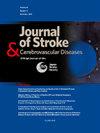缺血性脑血管病患者纤维蛋白原与认知功能障碍之间的关系
IF 2
4区 医学
Q3 NEUROSCIENCES
Journal of Stroke & Cerebrovascular Diseases
Pub Date : 2025-02-12
DOI:10.1016/j.jstrokecerebrovasdis.2025.108227
引用次数: 0
摘要
本文章由计算机程序翻译,如有差异,请以英文原文为准。
Association between fibrinogen and cognitive impairment in patients with ischemic cerebrovascular disease
Objectives
Fibrinogen has been reported as a potential risk factor for vascular dementia (VaD). However, the association between fibrinogen and cognition in patients with ischemic cerebrovascular disease (ICVD) has not been studied adequately. We aimed to examine the association of fibrinogen with cognitive impairment among patients with ICVD and to test whether white matter hyperintensities (WMH) and brain atrophy play a role under the association.
Methods
In this case-control study, ICVD patients were recruited from the Neurology Department. Cognitive function was assessed using the Montreal Cognitive Assessment. WMH and brain atrophy were quantified by brain magnetic resonance imaging (MRI). The associations of fibrinogen with cognition and MRI markers were investigated by conditional logistic regression models and generalized additive models.
Results
The risk of cognitive impairment increased with each unit increase in fibrinogen (AOR = 1.92, 95 % CI = 1.06 - 3.48). Individuals with fibrinogen levels > 4 g/L presented a substantially higher risk of cognitive impairment than those with fibrinogen levels of 2-4 g/L (AOR = 5.72, 95 % CI = 1.22- 26.82). Fibrinogen was negatively correlated with global cognitive function (rs = -0.235) and visuospatial/executive function (rs = -0.251). A negative correlation between fibrinogen and normal-appearing white matter (NAWM) volume was observed (rs = -0.282).
Conclusions
Fibrinogen is associated with cognitive impairment among patients with ICVD, and significantly negatively impacts global cognitive function and visuospatial/executive function. Furthermore, the negative correlation between fibrinogen and NAWM volume supports further exploration of potential mechanistic paths.
求助全文
通过发布文献求助,成功后即可免费获取论文全文。
去求助
来源期刊

Journal of Stroke & Cerebrovascular Diseases
Medicine-Surgery
CiteScore
5.00
自引率
4.00%
发文量
583
审稿时长
62 days
期刊介绍:
The Journal of Stroke & Cerebrovascular Diseases publishes original papers on basic and clinical science related to the fields of stroke and cerebrovascular diseases. The Journal also features review articles, controversies, methods and technical notes, selected case reports and other original articles of special nature. Its editorial mission is to focus on prevention and repair of cerebrovascular disease. Clinical papers emphasize medical and surgical aspects of stroke, clinical trials and design, epidemiology, stroke care delivery systems and outcomes, imaging sciences and rehabilitation of stroke. The Journal will be of special interest to specialists involved in caring for patients with cerebrovascular disease, including neurologists, neurosurgeons and cardiologists.
 求助内容:
求助内容: 应助结果提醒方式:
应助结果提醒方式:


